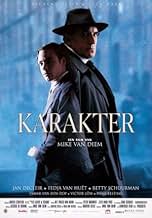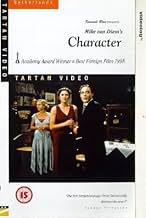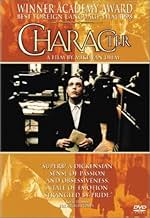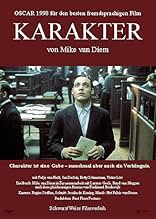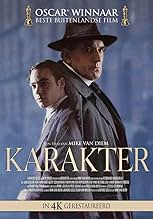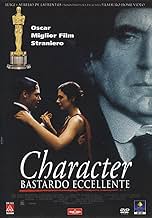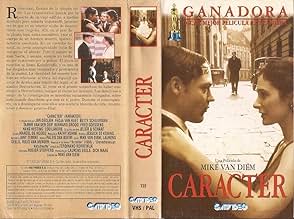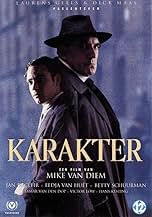AVALIAÇÃO DA IMDb
7,7/10
12 mil
SUA AVALIAÇÃO
Adicionar um enredo no seu idiomaJacob Katadreuffe lives mute with his mother, has no contact with his father who only works against him and wants to become a lawyer, at all costs.Jacob Katadreuffe lives mute with his mother, has no contact with his father who only works against him and wants to become a lawyer, at all costs.Jacob Katadreuffe lives mute with his mother, has no contact with his father who only works against him and wants to become a lawyer, at all costs.
- Direção
- Roteiristas
- Artistas
- Ganhou 1 Oscar
- 18 vitórias e 7 indicações no total
Avaliações em destaque
It's no wonder that this Dutch drama got the 1997 Academy Award for the best foreign country movie in the year of "Titanic". It tells the rise-and-fall-story of a young man in the Netherlands of the 1920's who's working hard to escape from the ghetto and to become an idealistic lawyer. Unfortunately his brutal an tyrannic father fights against him in any possible way, and at the end father and son are facing in a hard fight for life and death.
The story is great, the characters (sic!) of the plot even more, and the acting is pure adrenaline-driven. The whole atmosphere, supported by the dark filming locations of Amsterdam, Belgium, Germany (the Speicherstadt in Hamburg) and Poland, is disturbing and depressing. A great psycho drama and insight into the human psyche with a powerful performance by Jan Decleir as villain Dreverhaven that can easily compete with Anthony Hopkins' Hannibal Lecter movies!
The story is great, the characters (sic!) of the plot even more, and the acting is pure adrenaline-driven. The whole atmosphere, supported by the dark filming locations of Amsterdam, Belgium, Germany (the Speicherstadt in Hamburg) and Poland, is disturbing and depressing. A great psycho drama and insight into the human psyche with a powerful performance by Jan Decleir as villain Dreverhaven that can easily compete with Anthony Hopkins' Hannibal Lecter movies!
10typos
This is a movie that grips right away. While it has a dark setting, sparse but classic, the characters are rich. The love and care that Mike van Diem and the actors put in this film is visible. Thanks to significant contributions from both Dutch and Belgian TV stations, this movie is a rare treat, which is for once not spoiled by overly commercial requirements from demanding advertisers... As i understand, the film company First Floor Features had this film for decade(s?) in the planning, and it is a happy coincidence that it was realized the way you can enjoy it now. It has thus become a monument honoring the fabulous writer F. Bordewijk, the Dutch life and mind of the beginning 1900's, the craftsmanship of a dedicated cast, and a generous producer.
Jan Declair as the stony-hearted usher Dreverhaven is a character you won't forget for a long time. His softer side is time and again rejected by taciturn Joba, his former housekeeper who became pregnant in one lonely weak moment of them both. For several years, he offers her to marry her, or at least to contribute for the upbringing of his illegitimate son Kattedreuffe. She as many times rejects: 'We do not need anything.' On a precarious occasion, Dreverhaven denounces Jacob Kattadreuffe nevertheless, and from that moment on, father and son have a harsh relation as well. -
Masterfully, fate intertwines their lives, as the story unfolds. Real gems are present everywhere, the scenery is breathtakingly picturesque, partly filmed in Rotterdam harbor, and in other places like Belgium and Poland. The movie constantly plays with time, but in a plausible way. As an example, when Kattedreuffe has an appointment at a bailiff's office after being framed into bankruptcy, the name plate blinks at once with his own name on it. And indeed, he starts a career in this very office that same day.
For a while, the lives of father and son seem only occasionally to coincide, but it is a silence before the storm. Every picture draws to the dramatic end which was glimpsed as the opening scene: Did Kattadreuffe murder Dreverhaven? Many instances shown would allow this conclusion, as the two fatally attract each other to fulfill their inner tragedy. Dreverhaven as this hard and desperate 'keeper of the law' who can not express love, and Kattadreuffe as the one who had to fight his whole life to arrive in a higher position, and then stands empty-handed, his love unreturned through his own stupidity (even his mother sees that Lorna Te George / Tamar van den Dop was an exquisite relation missed).
To kill (!) each other would suddenly seem like the best possibility and a liberation in such a dark hour, but the end has a surprise. The last minute smooths all the giant waves, and allows for a satisfying and ingenuous end scene. - Maybe you have to see this movie more than once to uncover the many hidden treasures, i strongly recommend to get it for yourself on DVD. The dark passionate music of 'Paleis van Boem' enhances perfectly the impressive scenery. It is an artwork that has more than earned the Oscar it has got as best foreign film in 1998, along with numerous other awards.
And i am proud to have been asked to participate with calligraphy and handwritten material, although it is only clearly visible in the last half minute when (my) hand writes the last words of the testament, undersigning with - (see for yourself!).
Jan Declair as the stony-hearted usher Dreverhaven is a character you won't forget for a long time. His softer side is time and again rejected by taciturn Joba, his former housekeeper who became pregnant in one lonely weak moment of them both. For several years, he offers her to marry her, or at least to contribute for the upbringing of his illegitimate son Kattedreuffe. She as many times rejects: 'We do not need anything.' On a precarious occasion, Dreverhaven denounces Jacob Kattadreuffe nevertheless, and from that moment on, father and son have a harsh relation as well. -
Masterfully, fate intertwines their lives, as the story unfolds. Real gems are present everywhere, the scenery is breathtakingly picturesque, partly filmed in Rotterdam harbor, and in other places like Belgium and Poland. The movie constantly plays with time, but in a plausible way. As an example, when Kattedreuffe has an appointment at a bailiff's office after being framed into bankruptcy, the name plate blinks at once with his own name on it. And indeed, he starts a career in this very office that same day.
For a while, the lives of father and son seem only occasionally to coincide, but it is a silence before the storm. Every picture draws to the dramatic end which was glimpsed as the opening scene: Did Kattadreuffe murder Dreverhaven? Many instances shown would allow this conclusion, as the two fatally attract each other to fulfill their inner tragedy. Dreverhaven as this hard and desperate 'keeper of the law' who can not express love, and Kattadreuffe as the one who had to fight his whole life to arrive in a higher position, and then stands empty-handed, his love unreturned through his own stupidity (even his mother sees that Lorna Te George / Tamar van den Dop was an exquisite relation missed).
To kill (!) each other would suddenly seem like the best possibility and a liberation in such a dark hour, but the end has a surprise. The last minute smooths all the giant waves, and allows for a satisfying and ingenuous end scene. - Maybe you have to see this movie more than once to uncover the many hidden treasures, i strongly recommend to get it for yourself on DVD. The dark passionate music of 'Paleis van Boem' enhances perfectly the impressive scenery. It is an artwork that has more than earned the Oscar it has got as best foreign film in 1998, along with numerous other awards.
And i am proud to have been asked to participate with calligraphy and handwritten material, although it is only clearly visible in the last half minute when (my) hand writes the last words of the testament, undersigning with - (see for yourself!).
Karakter is quite stunning on several levels. The cinematography is gorgeous - without the use of any noticeable special effects or surrealistic dream sequences. The quality of the filming surpasses that of most movies.
One of the best things for me (as an American) about watching foreign films is not knowing who most of the actors are, and this makes it easier to completely accept them as the characters they play. The two leads were outstanding, and the supporting characters (particularly Betty Schuurman as Joba, and Nans Kesting as Jan Maan) were very effective.
I found the story to be engrossing and - more than anything, the pacing amazed me. A person accustomed to reading classic novels would probably appreciate the way this film unfolded. There is a desire to reach the end, but no hurry.
For sure, this film wouldn't interest everyone, but I rank it among my favorite films. It deserved to win the Academy Award for Best Picture last year: for the story, for the performances, for the direction ... it's rare that one finds a movie so well-put together.
One of the best things for me (as an American) about watching foreign films is not knowing who most of the actors are, and this makes it easier to completely accept them as the characters they play. The two leads were outstanding, and the supporting characters (particularly Betty Schuurman as Joba, and Nans Kesting as Jan Maan) were very effective.
I found the story to be engrossing and - more than anything, the pacing amazed me. A person accustomed to reading classic novels would probably appreciate the way this film unfolded. There is a desire to reach the end, but no hurry.
For sure, this film wouldn't interest everyone, but I rank it among my favorite films. It deserved to win the Academy Award for Best Picture last year: for the story, for the performances, for the direction ... it's rare that one finds a movie so well-put together.
10gevalher
This is one of the best movies that I've seen till now. I was reluctant at first to see this movie, because it was not a "Hollywood" product, but after so many times seeing the trailer at the theater it picked my curiosity.
The story was set in Netherlands, and it develops unfolding the relationship between a father and his son. This was one of the best movies I've seen in a long time, because it touches the bottom of our hearts making thinking us (the public) about our own -sometimes- conflictive relations with our parents.
The two main stars gave us a duel as I've never saw before in a film, and to top all of this, the supporting characters were all believable as well as the magnificent locations.
This films really told a story, reflects well its age and overall has a well developed timing so you'll never lose interest in what is next, and has so many twists that your interest never decays. But I really liked the final one. This one only scene pays all the money and time you spent seeing it.
OUTSTANDING!!
The story was set in Netherlands, and it develops unfolding the relationship between a father and his son. This was one of the best movies I've seen in a long time, because it touches the bottom of our hearts making thinking us (the public) about our own -sometimes- conflictive relations with our parents.
The two main stars gave us a duel as I've never saw before in a film, and to top all of this, the supporting characters were all believable as well as the magnificent locations.
This films really told a story, reflects well its age and overall has a well developed timing so you'll never lose interest in what is next, and has so many twists that your interest never decays. But I really liked the final one. This one only scene pays all the money and time you spent seeing it.
OUTSTANDING!!
Many people describe the movie as distant and cold. But that's exactly what the makers were aiming for to stay congruent with the 2 novels of Bordewijk where Karakter / Character is based upon. Bordewijk's style is often described as Nieuwe Zakelijkheid (best translation: New Objectivity, think Sinclair Lewis), a counter movement to the upcoming Expressionism in the 20s of the last century. Instead of the idealism of Expressionists more emphasis was put on reality, objectivity and facts in a sober and distant form with little room for frivolity, superficial beauty, sentimentality or explaining behavior. Not only does the style of the novels reflect this, the world the characters inhabit has the same characteristics. Viewed from this standpoint they made an amazing adaptation from a novel, correct in both style and content. But the movie defines more than an art movement, because the characters portrayed tell a lot about the Dutch in general, and this in a way also defines Dutch national identity.
The story itself is about perseverance. Jacob is the son of a relation without love. His parents never marry, the mother leaves soon after she finds out she is pregnant. His mother is stubborn, his father a man without compassion working as a bailiff. Both parents push their son in their own way, his mother almost drives him out of her home, his father lends him money thus starting a battle over the upper hand in their relationship. The father brings adversity to his son in the hope to make him stronger. In line with the style of the novel none of the characters ever experience love. In fact the whole movie contains not one passionate scene. The only character showing emotion (De Gankelaar, an excellent role played by Victor Löw) leaves the country. It has a Nietzschian philosophical angle with the debate of lightness and weight: Jacob's burdens give his life a meaning, but are the sacrifices worth it?
Location scouts did a wonderful job here, because Karakter recreates pre-war Rotterdam, a city almost totally flattened by the Nazis (There is a harrowing photo of the city after the bombardments with only the main church still standing). The production and art departments made the sets with their darkish colors fitting the form and content of the movie. The camera is used in a way to create some fluidity in the scenes: It almost never is static as with so many character dramas.
Fedja van Huêt as Jacob and Jan Decleir as Dreverhaven seem to understand what's going on here and act accordingly. Tamar van den Dop as Lorna is probably the greatest weakness in the movie, with a terrible diction and limited body movement she's miscast here.
Mike van Diem makes only one movie, wins an Oscar, and disappears almost from the earth. Although rumor has it he does some script doctoring in Hollywood, with his current production rate he will surpass even Malick. As for now, this is by far the best Dutch movie ever made.
The story itself is about perseverance. Jacob is the son of a relation without love. His parents never marry, the mother leaves soon after she finds out she is pregnant. His mother is stubborn, his father a man without compassion working as a bailiff. Both parents push their son in their own way, his mother almost drives him out of her home, his father lends him money thus starting a battle over the upper hand in their relationship. The father brings adversity to his son in the hope to make him stronger. In line with the style of the novel none of the characters ever experience love. In fact the whole movie contains not one passionate scene. The only character showing emotion (De Gankelaar, an excellent role played by Victor Löw) leaves the country. It has a Nietzschian philosophical angle with the debate of lightness and weight: Jacob's burdens give his life a meaning, but are the sacrifices worth it?
Location scouts did a wonderful job here, because Karakter recreates pre-war Rotterdam, a city almost totally flattened by the Nazis (There is a harrowing photo of the city after the bombardments with only the main church still standing). The production and art departments made the sets with their darkish colors fitting the form and content of the movie. The camera is used in a way to create some fluidity in the scenes: It almost never is static as with so many character dramas.
Fedja van Huêt as Jacob and Jan Decleir as Dreverhaven seem to understand what's going on here and act accordingly. Tamar van den Dop as Lorna is probably the greatest weakness in the movie, with a terrible diction and limited body movement she's miscast here.
Mike van Diem makes only one movie, wins an Oscar, and disappears almost from the earth. Although rumor has it he does some script doctoring in Hollywood, with his current production rate he will surpass even Malick. As for now, this is by far the best Dutch movie ever made.
Você sabia?
- CuriosidadesAlthough the story takes place in the Dutch city of Rotterdam, many scenes were filmed in other cities across The Netherlands and Europe. This was because Rotterdam has very few buildings from this era left following heavy bombing during the Second World War. Filming locations included: Hamburg (Germany), Wroclaw (Poland), Antwerp and Ghent (Belgium) and The Hague (The Netherlands).
- Erros de gravaçãoIn one of the street scenes, you can see an extra in modern outfit and with no headwear on.
- Citações
Joba: Why don't you leave our boy in peace?
Dreverhaven: I'll strangle him for nine-tenths, and the last tenth will make him strong.
Principais escolhas
Faça login para avaliar e ver a lista de recomendações personalizadas
- How long is Character?Fornecido pela Alexa
Detalhes
- Data de lançamento
- Países de origem
- Central de atendimento oficial
- Idiomas
- Também conhecido como
- Character
- Locações de filme
- Breslávia, Voivodia da Baixa Silésia, Polônia(Miernicza 27, Wroclaw, Dolnoslaskie, Poland)
- Empresas de produção
- Consulte mais créditos da empresa na IMDbPro
Bilheteria
- Orçamento
- US$ 4.500.000 (estimativa)
- Faturamento bruto nos EUA e Canadá
- US$ 623.983
- Fim de semana de estreia nos EUA e Canadá
- US$ 37.268
- 29 de mar. de 1998
- Faturamento bruto mundial
- US$ 623.983
- Tempo de duração2 horas 2 minutos
- Cor
- Mixagem de som
- Proporção
- 1.85 : 1
Contribua para esta página
Sugerir uma alteração ou adicionar conteúdo ausente



